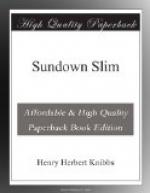Fernando called upon his saints and cursed himself for his negligence in leaving his son with the sheep. Nell Loring spoke to him quietly, assuring him that she understood why he had absented himself. “It’s my fault, Fernando, not yours. The patron will want to know why you were away. You will tell him that John Corliss came to your camp; that you thought I wanted to talk with him alone. Then he will know that it was my fault. I’ll tell him when I get back to the rancho.”
Fernando straightened his wizened frame. “Si! As the Senorita says, I shall do. But first I go to look. Perhaps the patron shall not know that the vaquero Corlees was here this morning. It is that I ask the Senorita to say nothing to the patron until I look. Is it that you will do this?”
“What can you do?” she asked.
“It is yet to know. Adios, Senorita. You will remember the old Fernando, perhaps?”
“But you’re coming back! Oh! it was terrible!” she cried. “I rode to the canon and looked down.”
Fernando meanwhile had been thinking rapidly. With quaint dignity he excused himself as he departed to catch up one of the burros, which he saddled and rode out to where his son was standing near the canon. The boy shrank from him as he accosted him. Fernando’s deep-set eyes blazed forth the anger that his lips imprisoned. He sent the boy back to the camp. Then he picked up the tracks of a horseman on the mesa, followed them to the canon’s brink, glanced down, shrugged his shoulders, and again took up the horseman’s trail toward the forest. With the true instinct of the outlander, he reasoned that the horseman had headed for the old trail to the Blue, as the tracks led diagonally toward the south. Finally he realized that he could never overtake the rider by following the tracks, so he dismounted and tied his burro. He struck toward the canon. A mile above him there was a ford. He would wait there and see who came. He made his perilous way down a notch in the cliff, dropped slowly to the level of the stream, and followed it to the ford. He searched for tracks in the sun-baked mud. With a sigh of satisfaction, perhaps of anticipation, he stepped to a clump of cottonwoods down the stream and backed within them. Scarcely had he crossed himself and drawn his gun from its weather-blackened holster, when he heard the click of shod hoofs on the trail. He stiffened and his eyes gleamed as though he anticipated some pleasant prospect. The creases at the corners of his eyes deepened as he recognized in the rider the vaquero who had set the Concho dog upon his sheep some months before. He had a score to settle with that vaquero for having shot at him. He had another and larger score to settle with him for—no, he would not think of his beloved sheep mangled and dead at the bottom of the canon. That would anger him and make his hand unsteady.




